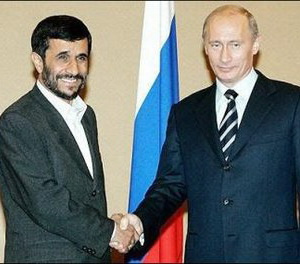Similar Problems, Similar Approaches

 Iran-Russia relations have undergone ups and downs during the past centuries. The neighborhood of these two countries has formed extensive relations between them. For tsars of Russia and for Soviet Union, Iran always carried significant import. Economic and political relations have been always under change; however, sustained relations have always preserved their significance for both countries. Although it was presumed that after dissolution of the Soviet Union Iran could not fulfill any interest of pro-West Russian leaders, the post-breakup developments showed that Iran could play a crucial role for Russia in Central Asia and Caucasus. Iran’s role in ending Tajikistan civil war and its abstinence in Russians’ treatment towards Chechnyan Muslims are some illustrative examples.
Iran-Russia relations have undergone ups and downs during the past centuries. The neighborhood of these two countries has formed extensive relations between them. For tsars of Russia and for Soviet Union, Iran always carried significant import. Economic and political relations have been always under change; however, sustained relations have always preserved their significance for both countries. Although it was presumed that after dissolution of the Soviet Union Iran could not fulfill any interest of pro-West Russian leaders, the post-breakup developments showed that Iran could play a crucial role for Russia in Central Asia and Caucasus. Iran’s role in ending Tajikistan civil war and its abstinence in Russians’ treatment towards Chechnyan Muslims are some illustrative examples.Historical suspicions rooted in events such as Golestan and Turkamanchai treaties which separated Iran’s Caucasian territories, Soviet Union’s greed for Iran’s oil and Iran’s occupation (1946-1947) continued after fall of the communist regime. Russia’s paradoxical measures in instances such as division of the Caspian Sea challenged the course to Iranians’ attitude shift toward their northern neighbor. Caspian Sea’s legal regime has turned into evidence which proves that Russia has not changed approach towards Iran and follows its historical pattern of conduct. Successive delays in handing the Bushehr nuclear power plant has aggravated the pessimistic mindset and reinforced the belief that Russia is taking advantage of Iran.
Parallel to increasing international pressures and Iran’s permanent face-off with the United States, Russia has expanded its ties with Iran, which seems as a reaction to West’s intimidation. Russians have always paid considerable attention to their policies towards Iran. As it was said, their paradoxical behavior towards the Caspian Sea’s legal regime, selling Iran on joint use of the sea and joining Kazakhstan and Azerbaijan in dividing and exploiting undersea resources strengthened the historical suspicions.
With a shift in Russia’s foreign policies which was accompanied by increasing confrontation with the United States and even the European countries, Tehran-Moscow ties found more importance. One important matter of dispute between Russia and West was the democratization process. Events such as shelling the Russian parliament in 1993, or invading Chechnya in 1994, and the second Chechnyan war, assassination of critical journalists, and even attempts to dispose of expatriate dissidents have faced the democratization process with serious doubts. Of course, Putin’s response to criticisms always has a reference to the history of Russia and their domestic version of democracy.
Iran’s similar political process in the post-reform era has brought further affinity between the two countries, in addition to strategic, regional and extraregional factors. After the color revolutions in Georgia, Ukraine and Kirgizstan, Russians have come to the belief that the United States intends to carry out a similar project in their country. Thus, they have launched their deterrent policies. In Iran, the conservatives make the same claims against the opposition, accusing them of planning a velvet revolution. However, what this group overlooks is the root of Iranian Islamic Revolution in which people toppled a political establishment armed to the teeth and enjoying the United States and Soviet Union’s support only through civil disobedience and Allah-o Akbar chants.
Iran’s efforts to join the Shanghai Cooperation Organization and gain Russia and China’s support –two countries whose development model is adopted by Iranian leaders- should be analyzed within this context. They try to focus their attention merely on economic affairs while countering any attempt to open up the political atmosphere. Latest instances are the bloody repression of Xinxiang Muslims in China and Russia’s crackdown on secessionist forces in Caucasia. Similar approaches seem to have moved Tehran closer to Moscow and Beijing.
This process has caused concerns among all pro-democracy forces inside Iran. That’s why two weeks ago we heard ’death to Russia’ slogan from the prayers while loudspeakers called people to chant ’death to America’. People are feeling the effects of alliance with China and Russia on the democratization process inside Iran, hence reacting against it. Ahmadinejad’s attendance in the Shanghai Cooperation Organization summit in Moscow right after the elections and Dmitri Medvedev’s congratulation, while millions of Iranians were protesting against the election results, revived the historical event of the Russian-backed Qajar dynasty against constitutionalist forces.

